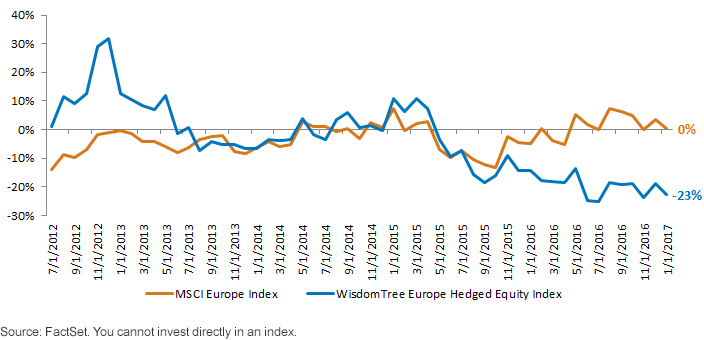European Exporters Signaling Rare Value Opportunity


An oft-repeated concern we hear from our clients is that as we enter the eighth year of a bull market cycle, U.S. equity markets have become expensive. When we think about consulting on portfolios for our clients, finding ways to reduce overall valuations is always near the top of our list of priorities. Right now, one way investors can reduce equity portfolio valuations is by increasing allocations to overseas stocks.
While recent months have seen flows go into emerging market and Japanese exchange-traded funds (ETFs), investors largely seem to be neglecting European stocks. This trend has continued from 2016, when European equities were among the most unloved asset classes, with over $23 billion in outflows for the year.1
Performance of European Stocks Has Been Better Than Expected
However, outflows from European stocks may not have been justified by their performance. The WisdomTree Europe Hedged Equity Index, which focuses only on dividend-paying exporters, very quietly had a strong 2016. The index returned 9.99%, in perhaps the most overlooked year of near double-digit returns imaginable. This performance may be a surprise to many given the level of outflows from Europe ETFs over the last year.
In a way, the Index’s 2016 performance indicated a longer-term trend. The WisdomTree Europe Hedged Equity Index was launched in July 2012. Since then, the Index has returned a cumulative 79.7%—nearly as much as the S&P 500’s 84.4%.2 Given client concerns about valuations in the U.S. markets (as each of the four major U.S. equity indexes have reached new all-time highs in the past few weeks), one may think that this sustained run of strong performance from the WisdomTree Index would also lead it to have lofty current valuations. However, this is far from the case.
Valuation Opportunities Emerging in Europe, but Not Everywhere
Since its inception, the WisdomTree Europe Hedged Equity Index has traded at an average of a 4% discount to the S&P 500.3 As of January 31, 2017, with the S&P 500 trading at a 21.6x price-to-earnings (P/E) ratio, the WisdomTree Europe Hedged Equity Index is only trading at a 16.7x P/E ratio, a 23% discount. This valuation gap is close to the largest it has been since the Index has existed.
P/E Ratio vs. S&P 500 Index

Interestingly, the attractive valuations shown by the WisdomTree Index are not shared by all European equities. In fact, over the same time period, the MSCI Europe Index has historically traded at a level similar to the WisdomTree Index, averaging a 3% discount to the S&P 500. As of this writing, the MSCI Europe Index is at 21.6x earnings, the same level as the S&P 500, and actually at a premium to its historical relative average.
What Is Causing This Discount: Better Underlying Earnings Growth
To be included in the WisdomTree Europe Hedged Equity Index, a company must derive at least 50% of its revenue from outside of Europe. Being over-weight in the more export-oriented sectors and under-weight in the domestically focused ones compared to most cap-weighted indexes brings tilts toward the Consumer Discretionary, Industrials, Technology and Consumer Staples sectors, while the two largest under-weighted sectors were Financials and Energy.
Over the past five years, there has been a divergence in European equity earnings growth. While each of the four largest over-weighted sectors for the WisdomTree Index have had relatively good growth in their earnings, Energy and Financials have seen their earnings contract over the past five years.
Thus, even though the price level of the WisdomTree Index has risen, the relative positioning of the Index has supported earnings growth and resulting valuations.
Returns Following Largest Valuation Gaps Have Been Promising
As mentioned earlier, the current 23% discount to the S&P 500 is one of the largest in the short history of the WisdomTree Europe Hedged Equity Index. In fact, a discount of this size has only happened in three months before, all in the past eight months (last June, July and November). While this certainly doesn’t leave us with a tremendous amount of history to analyze, the returns that followed each of these occasions have been very encouraging.
Since the valuation gap hit its all-time low of 25% last June, the WisdomTree Europe Hedged Equity Index has returned 15.6%, outpacing the returns on the relatively more expensive S&P 500 (which returned 9.9%) and MSCI Europe Index (which was up 7.2%). Similarly, the WisdomTree Index’s returns since July and November have been strong as well, having returned 9.1% and 6.7%, respectively.4 For standardized returns of the WisdomTree Europe Hedged Equity Index, click here.
Rebalancing Process Places Fundamentals above All Else
A key tenet of WisdomTree’s investment philosophy is the annual rebalancing, which introduces a value discipline into the investment process. This is done by increasing weights to companies that have improving fundamentals such as dividends or earnings (even if their stock price falls) and reducing exposure to those with eroding fundamentals.
This process typically leads to a reduction in P/E ratio for the Indexes, so it is not extraordinary to see a WisdomTree Index trading at a discount to a comparable cap-weighted index. However, the current discount being offered by the WisdomTree Europe Hedged Equity Index relative to the S&P 500 is uncharacteristically wide—and in the few precedents we can refer to, the subsequent performance has been impressive. Investors looking to help reduce the valuations in their own portfolios may be wise to take note of this rare opportunity they are currently being presented.
1Bloomberg.
2Bloomberg, as of 1/31/17.
3FactSet.
Important Risks Related to this Article
Investments focused in Europe increase the impact of events and developments associated with the region, which can adversely affect performance.Hedging can help returns when a foreign currency depreciates against the U.S. dollar, but can hurt when the foreign currency appreciates against the U.S. dollar.


